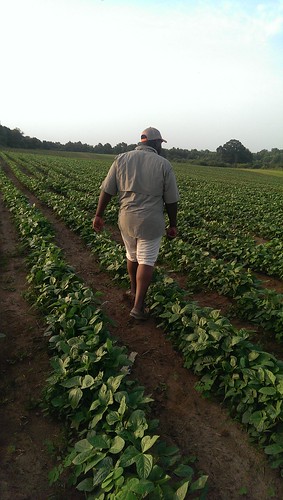
For the produce industry, the summer and fall of 2015 is more than a chance to share a new season of crops with customers. It’s when several of the Food and Drug Administration (FDA) Food Safety Modernization Act (FSMA) laws will become final. FSMA will make significant changes to the country’s food safety laws, including the first-ever regulation of fresh produce and a more proactive approach to preventing foodborne illnesses. My colleagues at the USDA’s Agricultural Marketing Service (AMS) have been working hard with our partners to expand our outreach efforts about food safety to help the produce industry prepare for compliance.
One of the ways that we help the industry prepare for compliance is through a successful partnership with Cornell University and the FDA via the Produce Safety Alliance (PSA). We recently renewed this partnership through a Cooperative Agreement that enables the three entities to devote funds for training and outreach events. Since 2010, AMS has enjoyed working with our colleagues to engage with produce growers, industry members, regulators, and extension educators through working committees, public meetings, focus groups, and webinars.
A major reason for our partnership with FDA and Cornell University is the ability of the AMS Good Agricultural Practices (GAPs) Audit Program to help produce businesses meet many FSMA requirements. As an independent third-party, this program, offered by our Specialty Crops Inspection (SCI) Division, verifies that operations are following industry-recognized food safety practices and recommendations from FDA.
For example, our Harmonized GAPs Food Safety audits helped a group of small growers in the Small Farmers Agricultural Cooperative meet Walmart’s food safety requirements. SCI employees worked with Tuskegee University to help the Alabama growers understand the audit’s requirements, setting them up to successfully supply the country’s largest retailer.
“Almost everybody you sell to wants to know that you are GAP certified,” said small grower Warren Ford. “Successfully completing the Harmonized GAPs Food Safety audit has done wonders for our business. After 3 years of GAP certifications, we have expanded our business from selling a couple hundred bushels of peas a summer to selling more than 3,000 cases a summer.”
This effort is a yet another example of one of the many ways USDA is creating opportunities in our nation’s rural communities. Through the StrikeForce Initiative, the department has invested $16 billion to support rural communities experiencing persistent poverty. As a result, department resources and outreach efforts have yielded success stories all over the country.
All of us here in the department are doing our best to create more success stories for the produce industry. Recently, our sister agency – the National Institute of Food and Agriculture (NIFA) – announced the availability of funds for food safety training, outreach, and technical assistance to support FSMA compliance. In June, the PSA will launch it national training programs with two Train-The-Trainer courses where participants can become certified to deliver the PSA Grower Training Course that was designed to help growers meet the proposed training requirement in the FSMA Produce Safety Rule.
Everyone in the produce industry needs to do whatever they can to prepare for FSMA. We encourage you to sign up for updates from the FDA, inquire about our SCI Division, and join the PSA list serve. USDA is all in for the team effort to prepare for FSMA. We need you on our team.

